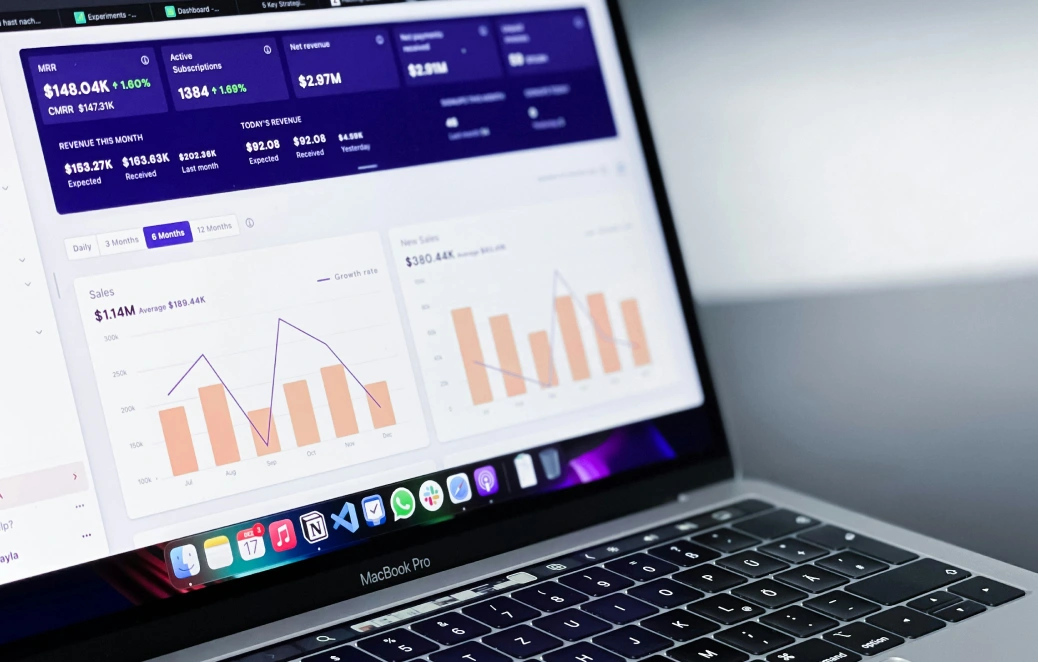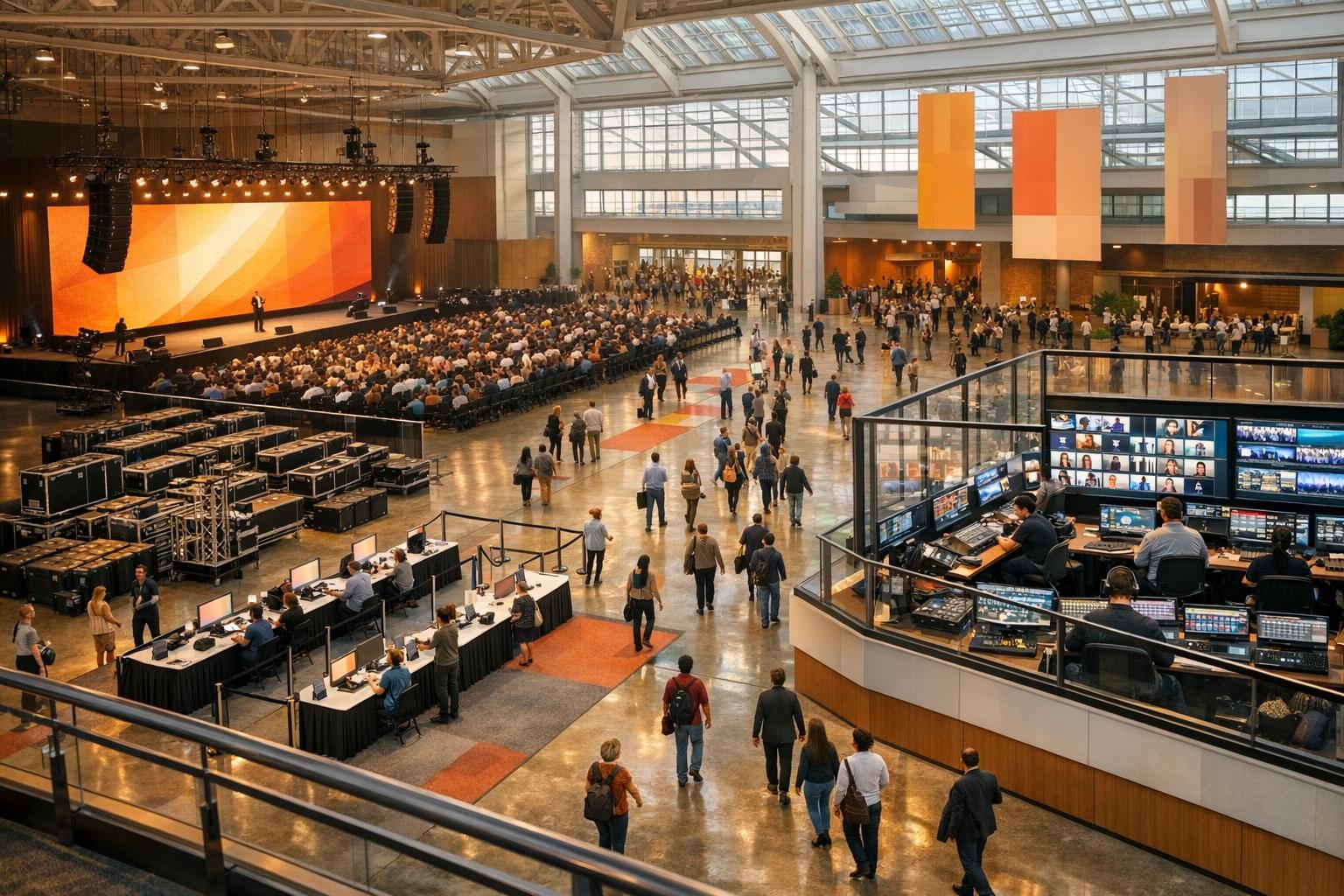Guide to Choose Your Next Conference Production Partner

Chief Executive Officer

Selecting the right conference production partner can make or break your event. Here's what you need to know upfront:
- Why it Matters: A good partner ensures smooth execution, minimizes risks, and aligns with your event goals.
- Key Steps:
- Identify Your Needs: Define event goals, technical requirements, and format (in-person, virtual, or hybrid).
- Evaluate Partners: Look for experience, technical skills, and strong project management.
- Ask the Right Questions: Focus on their track record, emergency handling, and cost transparency.
- Spot Red Flags: Avoid partners with poor communication or unclear pricing.
Quick Overview:
- Experience: Choose partners with relevant, recent experience.
- Technical Skills: Ensure they meet your AV, streaming, and backup needs.
- Budget Clarity: Request detailed cost breakdowns and avoid hidden fees.
- Communication: Reliable, responsive communication is non-negotiable.
The right partner acts as an extension of your team, ensuring your event runs smoothly and achieves its objectives. Prioritize reliability, expertise, and clear communication to set your event up for success.
Creating High Value Event Production Partnerships with Matthew Byrne
Understanding Your Conference Production Needs
Before diving into selecting a production partner, it's essential to have a thorough grasp of your event's specific requirements. This clarity will guide your decision-making and help you find the right fit for your conference production needs.
Defining Event Goals and Technical Requirements
Start by identifying the main objectives of your event. Are you aiming to boost audience engagement, deliver intricate technical content, or amplify your brand presence? Each goal demands a unique approach to production.
For example:
- Audience engagement: You might need interactive tools like polls, breakout sessions, or immersive lighting to keep participants involved.
- Content-heavy events: These often require professional setups, such as multiple camera angles, crystal-clear audio mixing, and high-resolution displays to showcase detailed presentations.
- Brand-focused events: Custom staging, tailored lighting designs, and seamless integration of corporate visuals can help reinforce your brand identity.
Beyond overall goals, define the specific technical needs. This might include wireless microphones, confidence monitors, or live streaming capabilities. Lighting setups can range from basic stage lighting for corporate meetings to dynamic effects for product launches. Don't overlook critical details like power requirements, internet bandwidth, or backup systems for essential equipment. These factors will directly influence your choice of a production partner.
Choosing Event Formats: In-Person, Hybrid, or Virtual
The format of your event - whether in-person, virtual, or hybrid - plays a major role in shaping your production needs and the expertise required from your partner.
- In-person events: Focus on venue acoustics, stage design, and on-site audiovisual support to create an engaging experience for attendees.
- Virtual conferences: Emphasize streaming technology, online engagement tools, and broadcast-quality production. This requires a partner skilled in platform integration, bandwidth management, and troubleshooting, along with expertise in multi-camera setups and professional audio.
- Hybrid events: These combine live and virtual elements, presenting unique challenges. Your partner must be adept at managing simultaneous live and online experiences, ensuring seamless interaction for both physical and remote audiences.
Hybrid events, in particular, demand meticulous planning, as they require more robust technical coordination and backup systems. Consider factors like the tech-savviness of your audience and the reliability of their internet connections to ensure a smooth experience.
Considering Venue and Compliance Requirements
The venue you select has a significant impact on the technical and logistical aspects of your event. As noted by The Production People:
"The venue you choose for your conference will not only impact on the audiences's overall experience, it can have a big impact on the technical specification too. For example, a venue with limited access points, power supply, network or ceiling height will alter the layout and equipment needed to create your event's set, stage and lighting design."
Evaluate the infrastructure of your venue carefully. Older venues, for instance, might have limited power distribution or low ceilings, which can restrict lighting or projection options. Poor acoustics may necessitate advanced audio systems or additional room treatments. Network reliability is another key consideration - venues with weak Wi-Fi or limited bandwidth may require backup internet solutions and network optimization.
Compliance is another layer to consider. For example, ADA accessibility standards may influence stage height, seating arrangements, and audio accommodations. International venues might also present challenges like differing electrical standards or broadcast regulations. Conducting an early site survey with your production partner can help identify these potential issues and allow time for adjustments or alternative plans.
Key Criteria for Evaluating Potential Partners
Once you've outlined your event's specific needs, the next step is to evaluate potential partners against a set of clear criteria. Doing this thoroughly ensures you find collaborators who can deliver the quality and dependability your event requires.
Experience and Track Record
Start by examining their portfolio and recent client history to get a sense of their capabilities. Look for partners who have successfully managed events similar in size, complexity, and focus to yours.
If you're planning a corporate event, this is especially important. Corporate gatherings demand a level of professionalism and precision that differs from social events or entertainment productions. For example, corporate conferences often require seamless tech integration, polished presentations, and minimal disruptions to business operations. A partner whose expertise leans toward weddings or concerts might not align with these needs.
Ask for case studies that highlight how they've tackled challenges in past events. These examples reveal their ability to adapt and handle crises - skills that can be critical if unexpected issues arise. Additionally, request client references from recent projects, ideally within the last 12-18 months. Since technology and industry standards change quickly, recent experience is more relevant. When speaking with references, focus on specifics: How well did the partner communicate? Were they effective at resolving problems? Would the client work with them again?
Once you're confident in their experience, take a closer look at their technical capabilities.
Technical Skills and Service Offerings
Think back to your event's technical requirements and evaluate whether the partner can meet them. Their technical expertise will play a huge role in your event's success. Start with their audiovisual (AV) capabilities - this includes sound systems, lighting setups, video production, and display technology. Corporate events often need advanced AV solutions, like wireless microphones, high-resolution LED walls, and flawless sound engineering.
Live streaming is another area to consider, even if your event is primarily in-person. Your partner should have experience with streaming platforms, multi-camera setups, and managing bandwidth for audiences ranging from 50 to 5,000. If you're hosting a hybrid event, they should also be skilled at integrating online engagement tools - like live polling, Q&A features, or breakout rooms - into the live experience. High-quality production for remote participants is key to ensuring everyone, whether in-person or online, feels equally involved.
Post-event analytics are becoming increasingly important for corporate clients. Partners who can provide detailed data - such as engagement metrics and attendance reports - help you measure the return on investment and refine future events.
Also, assess their equipment inventory and vendor relationships. Partners who own their essential equipment often offer better pricing and availability. Those with strong vendor connections can secure specialized gear when needed. Don’t forget to ask about their backup systems - reliable partners always have redundancies in place for critical components like audio, video, and streaming infrastructure.
Project Management and Collaboration
Strong project management can make or break your event. A good partner will have clear communication processes, detailed planning methods, and a proactive approach to problem-solving. These qualities ensure that all the technical and logistical requirements you’ve outlined come together smoothly.
Look for partners who schedule regular check-ins and provide comprehensive project timelines with clear milestones. They should assign a dedicated project manager to serve as your main point of contact throughout the planning process. This person should be accessible, responsive, and empowered to make decisions without unnecessary delays.
Top-tier partners also maintain detailed records, including decision logs and contingency plans, to avoid miscommunication and unexpected scope changes. During initial meetings, pay attention to their approach: Do they ask insightful questions about your goals? Do they suggest creative ideas to enhance your event? The best partners go beyond simply executing your requests - they act as advisors, offering industry knowledge and practical solutions to elevate your event.
Finally, evaluate their preparedness for unexpected challenges. Do they have backup plans for equipment failures, weather disruptions, or technical glitches during live streaming? Can they quickly replace faulty equipment or adjust to last-minute changes? Partners who regularly work with corporate clients understand the need for flexibility and often build it into their planning and pricing.
Questions to Ask When Reviewing Production Partners
Once you've outlined your event's goals and technical needs, it's time to evaluate potential production partners. Asking the right questions can help you determine whether a partner truly understands your requirements and has the expertise to deliver. A detailed conversation can cut through surface-level promises, giving you a clearer picture of their experience, problem-solving abilities, and pricing transparency.
Experience with Similar Events
Start by exploring their track record with events that match your scale, format, and industry. Avoid vague responses - ask for specific examples, complete with details about attendee numbers, technical demands, and outcomes.
-
"Describe a recent corporate conference similar in size and scope, and specify your role."
This can highlight their hands-on experience with events like yours. -
"What challenges did you face during that event, and how did you overcome them?"
Their answer will shed light on their problem-solving skills and how they handle unexpected situations. -
"How many events of our size have you managed in the past 18 months?"
Recent experience is particularly important, given the rapid changes in event technology and audience expectations. If your event has specific industry requirements, don't forget to ask about relevant experience in that area.
These questions can help you gauge how well they handle unforeseen challenges and whether they have the expertise to meet your needs.
Handling Problems and Emergencies
Every event comes with its share of surprises, so it's essential to understand how a partner manages crises.
-
"Detail your backup plans for equipment failures."
A dependable partner should describe redundant systems for audio, video, and streaming, along with established relationships to quickly source replacement gear. -
"What's your protocol when streaming fails during a hybrid event?"
Look for answers that include backup systems, clear communication strategies for remote attendees, and contingency plans to keep engagement high. -
"How do you handle last-minute speaker changes or technical requests?"
This question reveals how adaptable they are and whether they can maintain quality under pressure. -
"Can you share an example of a significant problem you solved during an event?"
Real-life examples can demonstrate their ability to resolve issues quickly and effectively.
These insights will help you determine whether they can handle the unexpected without compromising the event experience.
Cost Transparency and Deliverables
Operational expertise is crucial, but so is clarity about costs and deliverables. Make sure you understand their pricing structure and what's included in their services.
-
"Can you provide a cost breakdown showing fixed versus variable expenses?"
Conferences can range from $150,000 to over $3,000,000. Knowing which costs are fixed - like venue rental and AV equipment - and which are variable, such as staffing or add-on services, can help you budget more effectively. -
"What specific deliverables are included in your base package, and what would be considered add-ons?"
Clarity here can prevent unexpected expenses. For instance, are pre-event tech rehearsals, post-event analytics, or recording services included, or do they cost extra? Keep in mind that the average per-person cost for a conference can range from $500 to $2,500. -
"Outline any extra charges, your payment schedule, and how changes are handled."
Ask about common additional fees, such as overtime, extra equipment, or team travel expenses, and how they communicate pricing adjustments. -
"Can you provide references from clients with similar budgets who can speak to your cost management?"
Talking to past clients can offer valuable insights into how upfront and reliable they are about financial matters.
These questions will help you choose a partner who aligns with your event's goals and financial expectations, ensuring a smoother planning process.
sbb-itb-ae35a94
Red Flags to Avoid When Selecting a Partner
While asking the right questions can help you find strong candidates, it's just as important to recognize warning signs that could lead to trouble. These red flags often point to deeper problems with reliability, transparency, or professionalism - issues that can result in costly mistakes and disappointing outcomes. Spotting these signals early can protect your event's quality and ensure everything runs smoothly.
Focus Only on Low Pricing
It’s easy to be drawn to the lowest bid, especially when working with a tight budget. But choosing the cheapest option often comes with hidden trade-offs that can throw your event off track.
"While the lowest bid may be tempting, it often comes at the expense of quality and reliability." - The Panacea Co.
Be cautious of vendors whose low bids hide extra fees or who provide quick quotes without fully understanding your needs. Some may promise high-end equipment but later swap it out for lower-quality alternatives. Others might cut corners by skipping liability insurance or neglecting backup plans, leaving you exposed to financial and reputational risks.
A reliable partner will take the time to ask detailed questions and provide a thorough estimate, even if it takes longer to prepare. This effort shows they’re serious about delivering accurate pricing and avoiding surprises down the line.
Poor Communication and Values Mismatch
Beyond pricing, poor communication can be a major red flag. If a potential partner is slow to respond to emails, misses scheduled calls, or seems disorganized during the sales process, it’s likely these issues will continue once the project begins.
Hesitation to provide a clear budget breakdown could indicate hidden costs. Similarly, limited access to their team might lead to communication bottlenecks later on.
Another warning sign is when a vendor seems more focused on showcasing their technical skills than understanding your event’s goals. A good partner should feel like an extension of your team, fully invested in your success. They should prioritize clear, proactive communication from your first meeting to the post-event follow-up.
Take note if they introduce you to several team members early in the process. This level of transparency shows confidence in their team and a commitment to open communication throughout your collaboration.
Comparing Service Features and Capabilities
Once you've gathered your requirements and reviewed responses from potential partners, it's time to evaluate them systematically. Organizing your findings into a structured comparison will simplify your decision-making process and keep the focus on what truly matters for your event.
Using a detailed comparison table can transform scattered details into actionable insights. This method helps cut through marketing fluff and zero in on the factors that directly influence your event's success. A table like this allows you to objectively assess each partner's strengths and weaknesses at a glance.
Start by listing your key criteria across the top of the table. Include categories like technical capabilities, event format expertise, pricing, and communication practices. Each potential partner will occupy a row, with their specific offerings and limitations filled in under the relevant columns.
For technical capabilities, note their experience with your AV needs and whether they have policies for backup equipment. This is especially important if your event relies heavily on high-quality visuals and sound.
Event format expertise is another critical area, particularly if you're planning a hybrid or virtual event. Record each partner's familiarity with your preferred format, the platforms they use, and their track record with events of similar size and complexity.
The pricing structure section should go beyond listing the total cost. Include details like whether they charge a flat fee or hourly rates, how they handle overtime, and what’s included in their base package versus optional add-ons. Be sure to also document setup fees, travel expenses, and payment schedules.
Communication practices can make or break a collaboration. Track their response times during initial discussions, the number of team members involved, and their preferred tools for project management.
It’s also helpful to add a column for references and portfolio. This is where you can evaluate the quality of their past work and note whether their references expressed strong satisfaction or just mild approval.
Lastly, consider including a problem-solving approach column. Use their responses to your emergency scenario questions to gauge how they handle unexpected challenges. This insight can highlight whether their approach aligns with your risk tolerance and event needs.
Here’s an example of what your comparison table might look like:
| Evaluation Criteria | Partner A | Partner B | Partner C |
|---|---|---|---|
| AV Equipment | In-house 4K cameras, professional lighting | Third-party rentals, basic gear | Mixed: owns cameras, rents lighting |
| Hybrid Experience | 50+ hybrid events, custom streaming platform | Limited hybrid work, uses Zoom | Moderate experience, multiple platforms |
| Pricing Structure | Flat fee: $25,000 all-inclusive | Hourly: $150/hr + equipment costs | Tiered: $15,000 base + $200/hr overages |
| Communication | Dedicated project manager, 2-hour response | Rotating contacts, next-day replies | Single point person, same-day responses |
| Emergency Planning | Detailed backup protocols, redundant systems | Basic contingency plans | Comprehensive risk management |
Tailor the weight of each criterion to match your event’s priorities. For example, if technical reliability is non-negotiable, give more importance to AV capabilities and emergency planning. If staying within budget is critical, focus on transparent pricing and value for money.
Conclusion: Making the Right Choice for Your Event
Choosing the right conference production partner goes beyond finding someone to handle the technical details. It’s about selecting a professional who can tackle both strategic and technical challenges, ensuring your months of preparation aren’t derailed by avoidable issues.
A good partner will not only understand the unique aspects of your industry but will also communicate clearly and bring proven experience with events like yours. This creates a solid foundation for a smooth event, allowing you to focus on delivering great content and engaging with your attendees instead of stressing over logistics.
At this point, you have the tools to thoroughly evaluate potential partners. From defining your specific needs to using comparison tables and asking the right questions, you’re equipped to make an informed decision. By following this approach, you can confidently choose a partner capable of handling not just the expected hurdles but also any surprises that might come up during a live event.
Keep in mind, the cheapest option often comes with hidden costs. Transparent pricing and a track record of solving problems effectively tend to deliver the best value. Fixing mistakes during or after an event can be far more expensive than investing in a reliable partner from the start. Look for someone who offers clear pricing, demonstrates problem-solving expertise, and can provide solid references.
Your ideal production partner should feel like a natural extension of your team - someone who shares your vision, anticipates your needs, and brings creative ideas to elevate your event. Taking the time to make the right choice now not only ensures the success of your current event but can also build a lasting partnership that evolves with your future needs.
This decision is an investment in both your event’s success and your long-term strategy. With this guide, you’re ready to find a partner who will not just meet your technical requirements but also help strengthen your overall event planning and execution.
FAQs
How do I identify the technical needs of my conference to choose the right production partner?
When planning your event, begin by defining its goals, format, and the expectations of your audience. Decide whether the setup will be in-person, virtual, or hybrid, as this will influence the type of equipment you’ll need - think sound systems, lighting, and video displays. Don’t forget to factor in essentials like internet bandwidth, power supply, and safety measures to keep everything running smoothly.
To stay organized, put together a detailed checklist covering all technical requirements - everything from setup to teardown. Share this checklist with your production partners to ensure they fully understand your needs and can provide the right tools and support to deliver a seamless event.
What should I look for in a conference production partner, and how can I confirm they’re the right fit?
When selecting a conference production partner, it’s essential to prioritize experience, a proven history with corporate events, and the capability to manage hybrid or large-scale productions. Start by reviewing their portfolio to see their past work, request client references, and read testimonials to get a sense of their reputation and reliability.
Make sure they have solid expertise in audiovisual technology and a good grasp of events similar to what you’re planning. Communication is critical - ask detailed questions about their previous projects and how they’ve tackled challenges. A dependable partner will be open, adaptable, and show a clear commitment to understanding and achieving your event’s objectives.
How can I plan my budget with a conference production partner to avoid unexpected costs and ensure transparency?
To keep costs under control and maintain clarity, ask your conference production partner for a detailed breakdown of all expenses. This should include specifics like overtime charges, travel costs, and equipment fees. Make your budget limits clear from the start and request upfront pricing to avoid any surprises later on.
It's also smart to allocate a contingency fund - around 5-15% of your total budget - for unexpected expenses. This way, you're ready to handle any last-minute changes or emergencies without stress. Keeping communication open and asking targeted questions about possible hidden fees can help you manage your budget effectively while ensuring the planning process runs smoothly.
Related Blog Posts








